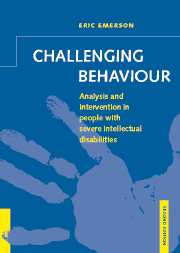10 - Challenges ahead
Published online by Cambridge University Press: 14 August 2009
Summary
In this chapter, we will return to some of the themes which have arisen throughout this book and draw attention to areas of research and practice which need to be explored in greater detail if applied behavioural approaches are to enhance their contribution to the design of effective community-based supports for people with severe intellectual disability and severe challenging behaviour. Three issues will be discussed: the interaction between behavioural and biological processes; early intervention and preventative services; and the changing social context of intervention.
Exploring the interaction between behavioural and biological processes
The evidence reviewed in Chapter 4 indicated that a wide range of cultural, social, behavioural, biological and psychiatric processes may be involved in the development and maintenance of challenging behaviour. Cultural and social processes are involved in defining behaviour as challenging (Lowe & Felce, 1995a,b) and in shaping people's reactions to those behaviours (Allen, 1999; Dagnan et al., 1998). Behavioural processes are implicated in the maintenance of some examples of challenging behaviour (Iwata et al., 1994a) and may be responsible for shaping the development of these behaviours over time (Guess & Carr, 1991; MacLean et al., 1994). Evidence also suggests that neurobiological mechanisms are involved in the expression of some examples of challenging behaviour (e.g. Sandman et al., 1998, 1999). Finally, circumstantial evidence suggests a link between psychiatric disorders and challenging behaviours (Emerson et al., 1999b).
Information
- Type
- Chapter
- Information
- Challenging BehaviourAnalysis and Intervention in People with Severe Intellectual Disabilities, pp. 155 - 164Publisher: Cambridge University PressPrint publication year: 2001
